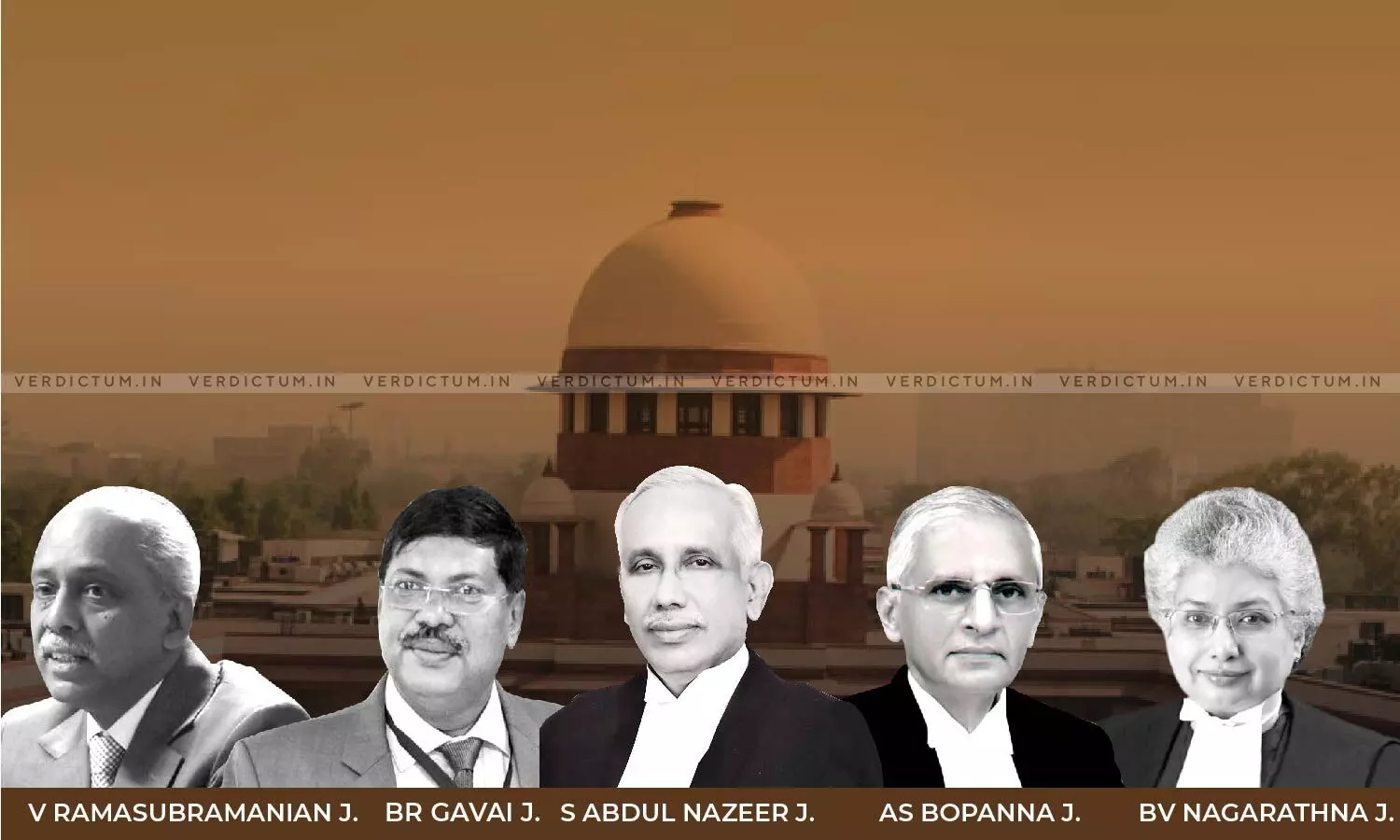
Power U/s. 319 CrPC Must Be Exercised Before Pronouncing Sentence In Case Of Conviction - SC's Constitution Bench
 |
|The Supreme Court's Constitution Bench of Justice S. Abdul Nazeer, Justice BR Gavai, Justice AS Bopanna, Justice V Ramasubramanian, and Justice BV Nagarathna has pronounced the judgment answering the reference regarding the ambit of powers under Section 319 of the CrPC.
Senior Counsel PS Patwalia and Counsel Puneet Singh Bindra appeared for the Appellant. AAG AK Prasad appeared for the State of Uttar Pradesh and ASG SV Raju appeared for the Union of India. Senior Counsel S Nagamuthu assisted the Court as an Amicus Curiae.
In this case, the substantial questions of law were placed before the Constitution Bench for consideration and were answered by the Court in the following manner:
1) Whether the trial court has the power under Section 319 of CrPC for summoning additional accused when the trial with respect to other co-accused has ended and the judgment of conviction rendered on the same date before pronouncing the summoning order?
"The power under Section 319 of CrPC is to be invoked and exercised before the pronouncement of the order of sentence where there is a judgment of conviction of the accused. In the case of acquittal, the power should be exercised before the order of acquittal is pronounced. Hence, the summoning order has to precede the conclusion of trial by imposition of sentence in the case of conviction. If the order is passed on the same day, it will have to be examined on the facts and circumstances of each case and if such summoning order is passed either after the order of acquittal or imposing sentence in the case of conviction, the same will not be sustainable."
2) Whether the trial court has the power under Section 319 of the CrPC for summoning additional accused when the trial in respect of certain other absconding accused (whose presence is subsequently secured) is ongoing/pending, having been bifurcated from the main trial?
"The trial court has the power to summon additional accused when the trial is proceeded in respect of the absconding accused after securing his presence, subject to the evidence recorded in the split up (bifurcated) trial pointing to the involvement of the accused sought to be summoned. But the evidence recorded in the main concluded trial cannot be the basis of the summoning order if such power has not been exercised in the main trial till its conclusion."
3) What are the guidelines that the competent court must follow while exercising power under Section 319 CrPC?
"(i) If the competent court finds evidence or if application under Section 319 of CrPC is filed regarding involvement of any other person in committing the offence based on evidence recorded at any stage in the trial before passing of the order on acquittal or sentence, it shall pause the trial at that stage.
(ii) The Court shall thereupon first decide the need or otherwise to summon the additional accused and pass orders thereon.
(iii) If the decision of the court is to exercise the power under Section 319 of CrPC and summon the accused, such summoning order shall be passed before proceeding further with the trial in the main case.
(iv) If the summoning order of additional accused is passed, depending on the stage at which it is passed, the Court shall also apply its mind to the fact as to whether such summoned accused is to be tried along with the other accused or separately. If the decision is for joint trial, the fresh trial shall be commenced only after securing the presence of the summoned accused.
(v) If the decision is for joint trial, the fresh trial shall be commenced only after securing the presence of the summoned accused.
(vi) If the decision is that the summoned accused can be tried separately, on such order being made, there will be no impediment for the Court to continue and conclude the trial against the accused who were being proceeded with.
vii) If the proceeding paused as in (i) above is in a case where the accused who were tried are to be acquitted and the decision is that the summoned accused can be tried afresh separately, there will be no impediment to pass the judgment of acquittal in the main case.
viii) If the power is not invoked or exercised in the main trial till its conclusion and if there is a split-up (bifurcated) case, the power under Section 319 of CrPC can be invoked or exercised only if there is evidence to that effect, pointing to the involvement of the additional accused to be summoned in the split up (bifurcated) trial.
(ix) If, after arguments are heard and the case is reserved for judgment the occasion arises for the Court to invoke and exercise the power under Section 319 of CrPC, the appropriate course for the court is to set it down for re-hearing.
(x) On setting it down for re-hearing, the above laid down procedure to decide about summoning; holding of joint trial or otherwise shall be decided and proceeded with accordingly.
(xi) Even in such a case, at that stage, if the decision is to summon additional accused and hold a joint trial the trial shall be conducted afresh and de novo proceedings be held.
(xii) If, in that circumstance, the decision is to hold a separate trial in case of the summoned accused as indicated earlier;
(b) In the case of acquittal the order shall be passed to that effect in the main case and then proceed afresh against summoned accused."
Click here to read/download the Judgment